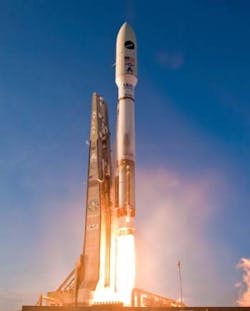Next Boeing-built Orbital Test Vehicle X-37B takes flight
Posted by John McHaleCAPE CANAVERAL AIR FORCE STATION, Fla., 8 March 2011. Boeing [NYSE: BA] announced the launch of the second Boeing-built X-37B Orbital Test Vehicle (OTV) for the U.S. Air Force Rapid Capabilities Office (RCO). The OTV was launched on an Atlas V rocket into a low-Earth orbit from Cape Canaveral Launch Complex 41.The first OTV was launched in April 2010 and orbited for approximately eight months. In December, it de-orbited and landed at Vandenberg Air Force Base, Calif., where it continues to undergo post-flight evaluation.The X-37B design combines the best of aircraft and spacecraft design into an affordable, unmanned space-based test platform. Program objectives include space experimentation, risk reduction, and concept-of-operations development for reusable space vehicle technologies."History was made in December when the X-37B became the United States' first unmanned vehicle to return from space and land on its own," says Craig Cooning, vice president and general manager of Boeing Space & Intelligence Systems. "The success of that mission validated this reusable and effective way to test new technologies in space and return them for examination. Today, we took another important step with the successful launch of the second OTV, enabling the RCO to further experiment with the vehicle and its ability to operate in low-Earth orbit." Boeing program management, engineering, test, and mission support functions for the OTV program are conducted at Boeing sites in Huntington Beach, Seal Beach, and El Segundo, Calif.
